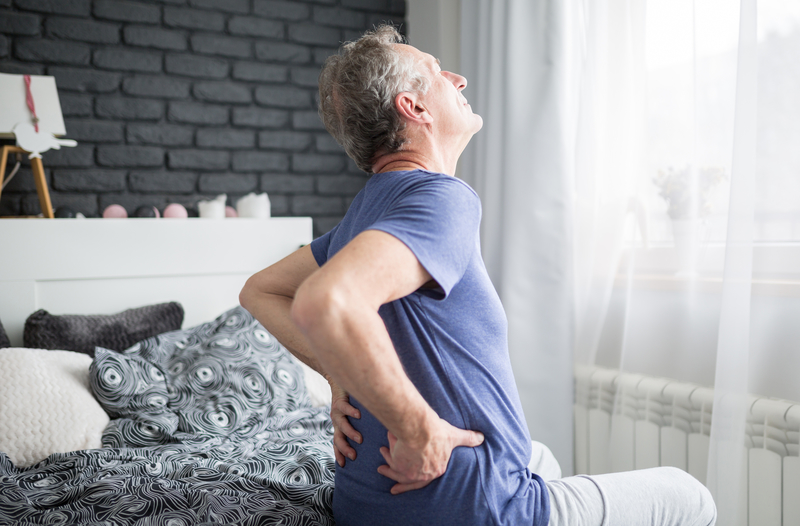Ask the Coaches: Why Do I Always Wake Up Sore?

– Matt
A: Oh man, Matt, do we feel your pain. Mornings can indeed be rough. While you might expect to feel a little (or a lot) tight and sore the day after a tough workout (or the day after that), when you go to sleep feeling fine—or better than fine—and you wake up feeling sore, it can make you start wondering what’s happening.
We recommend visiting your healthcare practitioner if you have unusual or sudden pain or if your pain is getting worse, as those could be signs of an injury, illness, or something more severe. If you are just waking up moderately sore, it’s likely that you’re just, well, a mammal.
You see, recent research (circa 2016) examining mice with inflammatory arthritis suggests that we may have inflammatory rhythms. During the night (or dark phase), researchers found that the mice experienced significantly decreased inflammatory markers such as paw swelling and expression of cytokines, which are inflammatory proteins. 1 On the flipside, the researchers found that markers of inflammation were heightened during the light phase. The researchers also found a similar pattern of inflammation in healthy limbs.
Lest you think, I’m a man, not a mouse, earlier studies indicated the same mechanisms for inflammation in humans with arthritis and found the same expression for the “clock genes.” 2
What does all of this mean? If you’re waking up sore in the morning, it’s likely because of the body’s circadian rhythm (the body’s 24-hour clock), which controls inflammation variability3 and suppresses inflammation in the night as you sleep. Yet once morning comes, the inflammation is turned back on, as shown by a “morning peak in circulating cytokine levels,” resulting in pain and stiffness. 1
Other research has shown a similar circadian rhythm in the spine, which can explain why low-back stiffness is often worse upon waking. 4 Not surprisingly, inflammation tends to increase as we get older. 5
Basically, when you wake up in the morning, your body’s natural anti-inflammatory chemicals take a little while to kick in—which is why you start feeling less sore and looser as the day goes on. It’s your body’s natural rhythm. Of course, movement helps get the blood flowing, and that’s important to help dull the soreness. On the other hand, since you’re not moving much while you sleep, inflammatory chemicals are capable of accumulating.
Granted, this research is limited to inflammatory arthritis, so further investigation is needed. However, it does provide at least one potential reason we wake up sore.
Speaking of sleep, if you’re not getting enough or you’re sleeping poorly—tossing and turning, up and down during the night—that can have an impact too. You see, not getting enough sleep can heighten your sensitivity to pain. Of course, if you’re in pain, that can mess with your sleep, so the pain-sleep connection is a bit of a catch-22.
Your soreness may be made worse by a wonky pillow; a worn-out bed; sleeping in a funky position; or a bed-hog dog, cat, or significant other, but at least to some degree, your stiffness and soreness is likely due to your body’s natural inflammatory cycle controlled by circadian rhythms. And getting on a regular, consistent sleep schedule, even on the weekends, could help.
If you enjoy working out in the mornings, give yourself a little extra time to warm up. Don’t stop exercising, however, in an effort to avoid soreness. Regular exercise has been shown to limit inflammation, especially as we get older. 6,7
Also, if you tend to notice soreness in some areas more than others (such as your lower back), it could be a sign it’s taking more of a beating than it can handle. In other words, there’s probably a reason the body is sending more inflammatory chemicals to that area for repair and recovery. Maybe it’s posture, maybe it’s your job, or maybe it’s the remnants of a nagging injury. In any case, don’t ignore the smoke signals your body is sending you. Work with a qualified fitness specialist to see if there are areas of your body that need strengthening or mobility work.
In addition, avoid foods that increase inflammation in the body, like trans fats, refined carbohydrates and sugars, and refined vegetable oils. Instead, emphasize an anti-inflammatory diet that’s loaded with plenty of fiber-rich foods; vegetables and fruits; fatty fish; and organic, pasture-raised meats, dairy, and eggs.
Thanks again for the question, Matt! Here’s to waking up in the mornings feeling significantly less sore and stiff!






